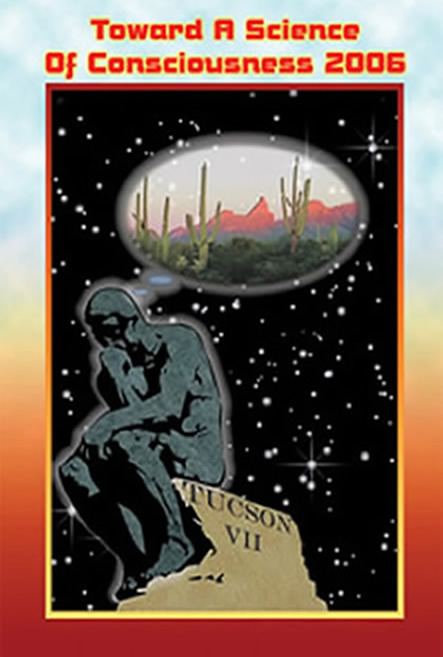|
Toward a Science of Consciousness 2006 April 4-8, Tucson Convention Center, Tucson, Arizona
Abstracts Now Posted - Click Here
Toward a Science of Consciousness - The Movie/DVD Chairing, format and A-V information
Toward a Science of Consciousness- Are we there yet?
far better. Some highlights of the scheduled program include the following: The plenary program is now complete: the Keynote talk on Wednesday, April 5 will be given by Giulio Tononi M.D., Ph.D. of the Center for Sleep and Consciousness at the University of Wisconsin. Professor Tononi has put forth the "Information integration theory" of consciousness, building upon and quantifying earlier work with Gerald Edelman on the Dynamic Core hypothesis. Tononi and colleagues are pursuing this approach using a variety of experimental and theoretical modalities. Sleep is another key interest of Tononi and his group who have recently shown significant differences in cortical connectivity in sleep versus wakeful consciousness. His keynote talk should complement both the opening Plenary session on Neural correlates of consciousness (Walter Freeman, Ralph Freeman, Hakwan Lau), and the "Dream Debate" (Alan Hobson and Mark Solms). Temple Grandin, Ph.D., is the most accomplished autistic person in the world. She is the author of best-selling “Thinking in pictures and other reports from my life with autism”, “Emergence: Labeled autistic”, “Animals in translation” and other books, videos and DVDs, and an accomplished lecturer who has been featured on major television programs and magazines. Dr Grandin was one of the “challenged” people featured in Oliver Sacks’ book. “Anthropologist from Mars”. Sacks described Grandin’s first book “Emergence: Labeled autistic” as “Unprecedented because there had never before been an 'inside narrative' of autism; unthinkable because it had been medical dogma for forty years or more that there was no 'inside,' no inner life, in the autistic. . .extraordinary because of its extreme (and strange) directness and clarity. Temple Grandin's voice came from a place which had never had a voice. . .and she spoke not only for herself, but for thousands of others. . .” Seeming to have unique insight into the conscious minds of non-verbal animals, Grandin is also known for her work in handling and humane slaughter of cattle and other animals. She is an Associate Professor at Colorado State University, and her websites are http://templegrandin.com/templehome.html and http://www.grandin.com/ The abstract for her talk (on Saturday April 8) "I think in pictures instead of language" can be found here. Dream debate: The significance of dreams and the role of Freud and the unconscious will be the topic of a formal debate between psychiatrists J. Allan Hobson from Harvard Medical School, and Mark Solms from London’s St. Bartholomew's and Royal School of Medicine. Hobson maintains that dreams are noise whose bizarre character stems from the same neurochemistry responsible for hallucinations, and that Freud is irrelevant. Solms points to new imaging results showing significant activity in brain regions underlying emotional drives and reward during REM sleep. The debate will reprise Solms’ 2004 Scientific American piece "Freud returns" and Hobson’s response "Like a bad dream". This should be fun. The eminent cognitive science pioneer Douglas Hofstadter from Indiana University will also speak at Tucson for the first time. He is Professor of Cognitive Science, Computer Science, History, Philosophy, Comparative Literature, and Psychology. Professor Hofstadter has received (among other awards) a Pulitzer Prize, Guggenheim fellowship and a 1980 American Book Award for "Gödel, Escher, Bach: An eternal golden braid". He has also written "Metamagical themas: Questing for the essence of mind and pattern", and (with Daniel Dennett) "The Mind's I: Fantasies and reflections on self and soul". Professor Hofstadter is now writing a book about consciousness and will speak to us about his new ideas.
And the always to-the-point UC Berkeley’s John Searle, Mills Professor of Philosophy and Language will speak on "Dualism revisited", describing his latest views on status of modern approaches to the understanding of consciousness. Originator of the famous “Chinese room argument”, Searle is the author of "Mind: A brief introduction", "The mystery of consciousness", and "The rediscovery of the mind". In the Meditation session, Antoine Lutz and John Dunne will discuss their findings (e.g. their PNAS paper) on EEG in Tibetan monk meditators vs control meditators. They found in the Tibetans the highest amplitude gamma synchrony ever reported! Other plenary speakers will include philosophers David Rosenthal, Uriah Kriegel, Robert van Gulick and Paavo Pyllkanen, neuroscientists and cognitive scientists Walter Freeman, Michael VL Bennett, Dan Simons, Peter DeWeerd, Ralph Freeman, Susana Martinez-Conde and Steven Lehar, neurologists Nicholas Schiff and Steven Laureys, anthropologist Marylin Schlitz and virtual reality expert Maria Sanchez-Vives. Plenary sessions will be devoted to topics including the neural-level correlate of consciousness, consciousness and chronic vegetative states, consciousness and emotion, Freud and dream science, cognitive architectures, visual fading, virtual reality, meditation and brain states and self-representational theories of consciousness and the physics of life.
Pre-conference workshops will provide in-depth tutorials in many different areas.
|
|
|||||||||||||
